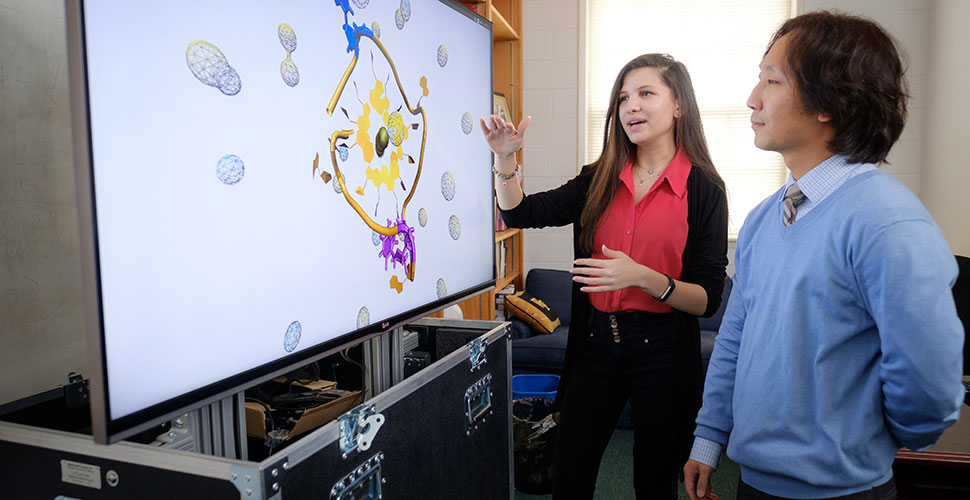Undergrad’s cancer research success earns international attention
When Manal Ahmidouch began her freshman year at Wake Forest University, she wasn’t sure which major she would pursue. She only knew that her father, a nuclear physicist, had advised her to think long and hard before taking his path.
She didn’t listen.
With a biophysics major and a triple minor in math, Arabic, and Middle Eastern and South Asian studies, the Greensboro, N.C., resident is in her junior year, using computer simulation to identify DNA molecules that would be excellent targets for cancer drugs.
Ahmidouch will speak at the Biophysical Society’s 61st Annual Meeting, Feb. 11-15 in New Orleans. She is only one of 12 people worldwide to receive a prestigious travel scholarship from the society’s Committee for Inclusion and Diversity to attend the international meeting, where she will share her undergraduate research experience during a panel.

That Ahmidouch has found her niche in science and technology can be an inspiration to other students. According to the National Science Foundation, only 18.2 percent of computer science degrees awarded in 2014 went to females; that same year, only 39.7 percent of degrees in the physical sciences went to females. Increasing the participation of women and under-represented minorities in science careers has become a national priority for educational institutions and corporations that see an opportunity for scientific breakthroughs by broadening the perspective of research teams.
Ahmidouch got hooked on science early on at Wake Forest by pursuing a research project in her freshman year.
“The opportunity to do research really helped guide my decision,” she said.
“At first, it was very overwhelming – I was teaching myself computer science to keep up. In the end, I patted myself for figuring out how to do it, with the help of Dr. Cho.” Manal Ahmidouch
Sam Cho, an associate professor of physics and computer science, said it is unusual for students to join a research group in their first year of college because the work is so challenging.
“I usually turn away students at that level, but Manal came highly recommended,” Cho said.
“I knew that she was a very, very bright student, and it turned out it was worth taking a chance.” Sam Cho, associate professor of physics and computer science
He said Ahmidouch likely will publish an academic paper based on her research – another rarity for an undergraduate.
Ahmidouch spends some of her free time outside the lab mentoring high school girls interested in STEM – or science, engineering, technology and math.
“I hold a great optimism that this generation will elevate women in the scientific world,” she said.
Learn more about how Wake Forest supports women in STEM:

